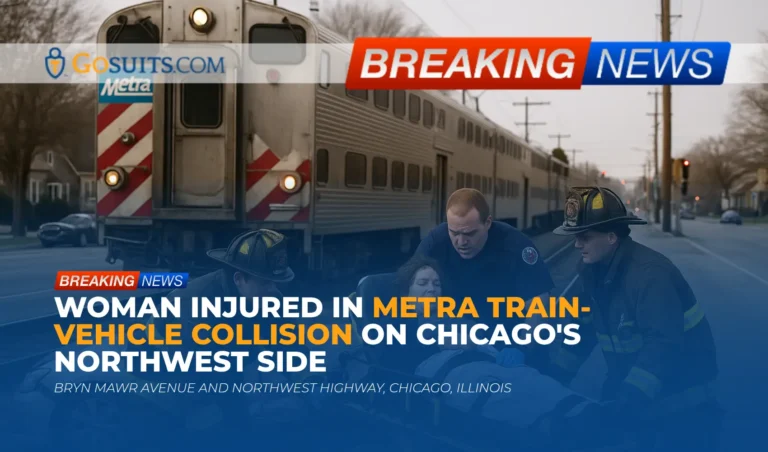A woman sustained injuries Wednesday afternoon when a Metra UP-NW train collided with a vehicle on Chicago’s Northwest Side. The incident occurred near the Norwood Park and Gladstone Park neighborhoods, causing temporary disruptions to train service in both directions.
Incident Details
According to reports, the collision took place at the intersection of Bryn Mawr Avenue and Northwest Highway. A Metra spokesperson indicated that the train struck the vehicle, but it did not remain on the tracks after the impact. Emergency services responded to the scene, and the injured woman was transported to a local hospital. Her injuries were described as non-life-threatening.
The collision prompted Metra officials to halt train traffic in the vicinity while authorities investigated the scene and attended to the injured individual. Service has since resumed, but the exact duration of the delays remains unclear.
Potential Legal Implications of Train Accidents
Train accidents, like the recent Metra collision, can raise complex legal questions, particularly concerning liability and the rights of injured parties. While each incident is unique, several factors typically come into play when determining fault and potential compensation.
Negligence
Negligence is a core concept in personal injury law. It generally refers to a situation where a party’s failure to exercise reasonable care results in harm to another person. In the context of a train accident, negligence could stem from various sources, such as:
- Operator Error: A train operator’s negligence, such as speeding, failure to heed signals, or inattentiveness, could cause an accident.
- Maintenance Issues: Improper maintenance of trains or tracks can lead to equipment failures and subsequent collisions.
- Signaling Problems: Malfunctioning or poorly designed railroad signals can contribute to accidents.
- Third-Party Negligence: In some cases, the negligence of a third party, like a driver failing to yield at a railroad crossing, may be a contributing factor.
Duty of Care
Railroad companies have a duty of care to ensure the safety of their passengers and the public. This duty extends to maintaining safe equipment, employing competent personnel, and adhering to safety regulations. If a railroad company breaches its duty of care and an accident occurs, the company may be held liable for resulting injuries and damages.

Railroad Crossings
Railroad crossings can be particularly hazardous locations. Trains require considerable distance to stop, making collisions with vehicles a significant risk. Railroad companies and local authorities have a responsibility to ensure that crossings are adequately marked and equipped with safety devices, such as flashing lights and gates. Motorists, in turn, must exercise caution and obey all traffic signals when approaching a railroad crossing.
Potential Damages
Individuals injured in train accidents may be entitled to compensation for a variety of damages, including:
- Medical Expenses: This includes costs associated with hospital treatment, doctor visits, physical therapy, and medication.
- Lost Wages: Injured parties may be compensated for lost income if their injuries prevent them from working.
- Pain and Suffering: Compensation may be awarded for the physical pain and emotional distress caused by the accident.
- Property Damage: If a vehicle or other property is damaged in the collision, the owner may be entitled to compensation for repairs or replacement.
- Other Losses: Depending on the circumstances, other losses, such as diminished earning capacity or long-term care needs, may also be considered.
The Importance of Investigation
A thorough investigation is essential to determine the cause of a train accident and identify all responsible parties. This investigation may involve:
- Accident Reconstruction: Seasoned professionals can analyze the evidence at the scene to determine how the collision occurred.
- Witness Interviews: Statements from witnesses can provide valuable insights into the events leading up to the accident.
- Review of Records: Examining train maintenance logs, operator records, and other relevant documents can help uncover potential negligence.
- Expert Consultation: Consulting with experts in fields such as engineering and railroad safety can provide critical analysis and opinions.

Commentary from Gosuits Chicago, Illinois Personal Injury Attorney
Train accidents can have devastating consequences for those involved. In addition to the physical injuries, victims may experience significant emotional trauma and financial hardship. Determining liability in these cases can be complex, often requiring a detailed investigation and a deep understanding of railroad regulations and safety standards. If you or a loved one has been injured in a train accident, it is crucial to seek guidance from a skilled personal injury attorney who can protect your rights and help you pursue the compensation you deserve.






